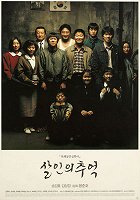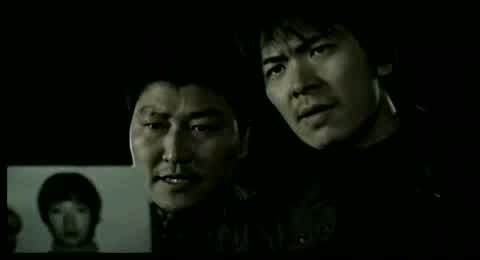Rendező:
Joon-ho BongOperatőr:
Hyung-koo KimZeneszerző:
Tarō IwashiroSzereplők:
Kang-ho Song, Sang-kyung Kim, Roe-ha Kim, Jae-ho Song, Hee-bong Byun, Seo-hui Go, Nou-sik Park, Hae-il Park, Mi-sun Jeon, Young-hwa Seo, Jong-ryul Choi (több)Tartalmak(1)
Két nyomozó egy kitervelt gyilkosság-sorozat után nyomoz. Az elmúlt négy évben tíz nőt erőszakoltak és öltek meg egy kis kerületben. A gyilkos idővel tökéletesítette a módszereit, és úgy tűnik, lehetetlen elkapni. Minden eszközt bevetnek a siker érdekében, több mint háromezer gyanúsítottat hallgatnak ki, még sem jutnak eredményre. A két nyomozó az életét teszi fel az ügyre, hogy a kegyetlen gyilkost megállítsák. (RTL Klub)
(több)Recenziók (5)
This grounded me... it's actually the Asian equivalent of a metaphysical and social detective story (I thought of Once Upon a Time in Anatolia several times, albeit more like a distant resonance), and at the same time a unique genre mutagen that transforms from introductory comedic and satirical tones to a dark thriller monster. The motifs of obsession, zeal and unpredictability of the perpetrator remind of Fincher's Zodiac - or rather the opposite (Memories of Murder is similar in its extremely slow pace and conservative resistance to efficiency). The gradation is a subtle, but absolutely unique, the character structure is fascinating (transforming a boorish detective into a tragic hero in a few minutes - brilliant), and the staging of some scenes thoughtful from the camera movement to the situational framework (from brothel-type nonsense with a commander puking to exciting murder scenes). I'm trying to remember the last time I enjoyed a thriller about a serial killer like this in all its shades... it was probably Zodiac, but Memories of Murder is funnier and more subversive. I see that my gaps in Korean cinema are alarming and are demanding to be filled!
()
An outstanding, dark crime movie with a social conscience based on real events that is rather unfairly dubbed as a second Se7en. OK, here they investigate serial murders, but that is about all that these pictures have in common. Memories of Murder treads its own, untraditional, “mirror holding" path. For a long time it makes out that it is a strange satire on the work of a small town police department. However, it gradually starts to gain dark undertones, the plot gets thicker and the strangeness at the beginning plays a fundamental role in the wonderful character development. The only serious negative apart from genre imbalance is how long it takes to get up to speed; the first half hour could easily be shortened some.
()
The cops were driving me crazy at first, and I started thinking maybe they only had one brain between them. But as the victims got worse, they started to realize the seriousness of the situation, threw aside the cheap humor, and kicked off a thrilling manhunt. That's when I stopped noticing anything else and got caught up in the plot. It had been a long time since I was so interested in an ending. Whether or not I understood it, I really don't know. But this is just another one of those endings that everyone explains in their own way. I take one star off for the beginning, which was all over the place and the fact that I didn’t get the meaning of it until sometime near the end of the film.
()
I have already mentioned several times in my reviews that I have a problem with East Asian cinema, as I have difficulty accepting its world of thoughts, ethical standards, and general cultural dimension. In some cases, I don't understand those films, in others, I can't identify with their ethical starting points, and in others, I simply dislike the director's style and unnatural movement and speech. South Korean cinema is a typical example of this. It has never happened that I gave more than 3 stars to any South Korean film, including those by the most acclaimed directors. Ironically, it did happen with this film, although it is a film in which I can point out many specific shortcomings, which would bother me disproportionately more with well-known American or European filmmakers. Whether it's the whole series of absurd elements in the investigation - which I would accept in countries in central Africa and maybe even in central America, but for technologically and culturally advanced South Korea, they seem unbelievable - naive twists in the script (the crucial discovery that changes investigators' point of view is clear from the beginning, even to a very average intelligent viewer without knowledge of forensic criminalistic methods), the strange genre classification when the film contains a number of comedic elements that, in my opinion, arose more as unintentional magic rather than a creative intention and end up being disruptive in the result. Nevertheless, this is a film that is not excellent, but interesting, and the culturally different perspective on society from the opposite end of the planet ultimately adds value to it, hence the fourth star I'm giving it. Additionally, despite my reservations about the script, I must acknowledge the film's quality in terms of the excellent music, editing, and camera work. Overall impression: 75%.
()
Typical Bong. The film gets moving slowly, approaching the characters with a weird detachment, in a similar way the obsolete and uneven rules of their society affects them. The practices of the investigators are abominable and morally questionable and soon the viewer wishes them no good. And nothing good will come their way, because this is not a tale about the suppression and punishment of evil, but about its elusiveness and unpredictability, as well as about the bitter demystification of good and questioning the required values which, unlike Western films, the Korean society of the time does not provide – the detectives don’t have families and their lives are only about their work full of violence, mistrust and fraud. However, through the repeated delaying of the climax and the feeling of growing hopelessness, the viewer gradually gets closer to the protagonist and begins to feel sorry for him, just as after a while he feels sorry for all the people he has interrogated. Existence itself becomes a crime and the investigation is only a way to come to terms with and make sense of it. If there’s one Hollywood film Memories of Murder reminded me of, it’s not Se7en, but Fincher’s Zodiac, which reflects on the hopelessness of the system and the final sense of moral inadequacy in a similar way. Together with Parasite, the best Bong so far. What’s interesting, though, is that whereas the ending ruined for me his Oscar winner, here it was the beginning that I couldn’t get into. 85%
()

